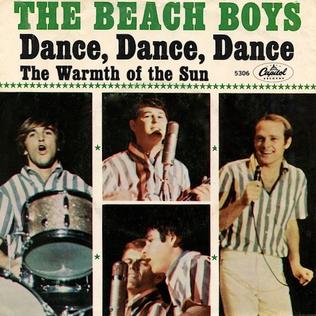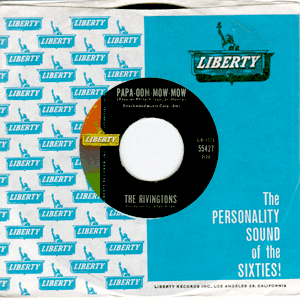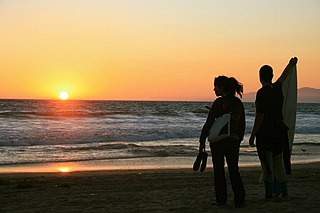
Jan and Dean were an American rock duo consisting of William Jan Berry and Dean Ormsby Torrence. In the early 1960s, they were pioneers of the California Sound and vocal surf music styles popularized by the Beach Boys.
Surf music is a genre of rock music associated with surf culture, particularly as found in Southern California. It was especially popular from 1958 to 1964 in two major forms. The first is instrumental surf, distinguished by reverb-heavy electric guitars played to evoke the sound of crashing waves, largely pioneered by Dick Dale and the Del-Tones. The second is vocal surf, which took elements of the original surf sound and added vocal harmonies, a movement led by the Beach Boys.

Carl Dean Wilson was an American musician who co-founded the Beach Boys. He was their lead guitarist, the youngest sibling of bandmates Brian and Dennis, and the group's de facto leader in the early to mid-1970s. He was also the band's musical director on stage from 1965 until his death.

Surfer Girl is the third studio album by the American rock band the Beach Boys, released September 16, 1963 on Capitol Records. It is largely a collection of surf songs. The LP reached number 7 in the U.S. and number 13 in the UK. Lead single "Surfer Girl", backed with "Little Deuce Coupe", was also a top 10 hit.
Jill Gibson is an American singer, songwriter, photographer, painter and sculptor. She is mostly known for her collaboration work with Jan & Dean and for having briefly been a member of the successful 1960s rock group the Mamas and the Papas. She was also one of the main photographers at the historic Monterey Pop Festival in 1967.

The Honeys were an American girl group, formed in Los Angeles in 1958, that initially comprised sisters Marilyn, Diane, and Barbara Rovell. Barbara was later replaced by their cousin, Ginger Blake. After 1962, the Rovell Sisters were rechristened "the Honeys" by the Beach Boys' Brian Wilson, who envisioned the group as a female counterpart to his band. Wilson served as the Honeys' record producer and chief songwriter, and later married Marilyn in late 1964.

"The Little Old Lady (from Pasadena)" is a song written by Don Altfeld, Jan Berry and Roger Christian, and recorded by 1960s American pop singers Jan and Dean. Singer/songwriter P.F. Sloan sings the falsetto part usually sung by Dean Torrence, while Dean sings one of the backup parts. This was the first time P.F. sang the falsetto on a single, although P.F. had already sung some falsetto on the last album Dead Man’s Curve/The New Girl In School.

"Surfin' Safari" is a song by American rock band the Beach Boys, written by Brian Wilson and Mike Love. Released as a single with "409" in June 1962, it peaked at number 14 on the Billboard Hot 100. The song also appeared on the 1962 album of the same name.

"Surfin'" is a song by American rock band the Beach Boys that was written by Brian Wilson and Mike Love. It was released as the debut record by the Beach Boys in November 1961 on Candix Records and was included on the October 1962 album Surfin' Safari.

"Dance, Dance, Dance" is a song by the American rock band the Beach Boys from their 1965 album Beach Boys Today!. Written by Brian Wilson, Carl Wilson, and Mike Love, it was first issued as a single in October 1964, backed with "The Warmth of the Sun". "Dance, Dance, Dance" marked Carl's first recognized writing contribution to a Beach Boys single, his contribution being the song's primary guitar riff and solo.

"Papa-Oom-Mow-Mow" is a novelty nonsensical doo-wop song by the Rivingtons in 1962. It peaked at number 48 on the Billboard Hot 100, and number 35 on the Cashbox charts. The band released two similar follow-up songs over the next several months, "Mama-Oom-Mow-Mow " and "The Bird's the Word".
Roger Val Christian was an American radio personality and songwriter from Buffalo, New York. After moving to California in 1959, he became a lyricist for the Beach Boys' Brian Wilson. From the early to mid-1960s, they wrote many songs together, mostly about cars, including the singles "Little Deuce Coupe" (1963), "Shut Down" (1963), and "Don’t Worry Baby" (1964).

"Surf City" is a 1963 song recorded by American music duo Jan and Dean about a fictitious surf spot where there are "two girls for every boy". Written by Brian Wilson, Jan Berry and Dean Torrence, it was the first surf song to become a national number-one hit.

"Dead Man's Curve" is a 1964 hit song by Jan and Dean whose lyrics detail a teen street race gone awry. It reached number eight on the Billboard Hot 100 singles chart and number 39 in Canada. The song was written and composed by Brian Wilson, Artie Kornfeld, Roger Christian, and Jan Berry at Wilson's mother's house in Santa Monica. It was part of the teenage tragedy song phenomenon of that period, and one of the most popular such selections of all time. "Dead Man's Curve" was added to the Grammy Hall of Fame in 2008.
Deadman's Curve is a 1978 American made-for-television biographical film based on the musical careers of Jan Berry and Dean Torrence. The film was developed from a 1974 article published in Rolling Stone by Paul Morantz, who also helped write the screenplay.

The California sound is a popular music aesthetic that originates with American pop and rock recording artists from Southern California in the early 1960s. At first, it was conflated with the California myth, an idyllic setting inspired by the state's beach culture that commonly appeared in the lyrics of commercial pop songs. Later, the sound was expanded outside its initial geography and subject matter and was developed to be more sophisticated, often featuring studio experimentation.
"The New Girl in School" is a song written by Jan Berry, Roger Christian, Brian Wilson, and Bob Norberg for the American rock duet Jan and Dean. It was the B-side of their hit single "Dead Man's Curve". Both songs were released on their album Dead Man's Curve / The New Girl In School. "The New Girl From School" charted at number 37 on the Billboard Hot 100. In Canada the song was co-charted with "Dead Man's Curve" and they reached number 39.
This is the discography for American rock duo Jan and Dean.
"You Really Know How to Hurt a Guy" is a song whose music was composed by Jan Berry, Jill Gibson, and Roger Christian, which was recorded by 1960s American pop singers, Jan and Dean. The song was recorded and released as a single and then appeared on the 1965 album Jan & Dean Golden Hits, Volume 2. The B-side of the single is "It's As Easy As 1,2,3." "You Really Know How to Hurt A Guy" reached up to number 27 on the Billboard Hot 100 on July 10, 1965, which was their highest-charting single of the year on the U.S. Billboard Hot 100, by edging "I Found a Girl" which charted at number 30 later in 1965. Jan and Dean were known for their music of the 1960s surf era with songs like "Dead Man's Curve," "Drag City," and "The Little Old Lady from Pasadena." This single marked the beginning of Jan & Dean getting away from their Surfing roots that they were known for.

"Surfin' U.S.A." is a song by the American rock band the Beach Boys, credited to Chuck Berry and Brian Wilson. It is a rewritten version of Berry's "Sweet Little Sixteen" set to new lyrics written by Wilson and an uncredited Mike Love. The song was released as a single on March 4, 1963, backed with "Shut Down". It was then placed as the opening track on their album of the same name.












